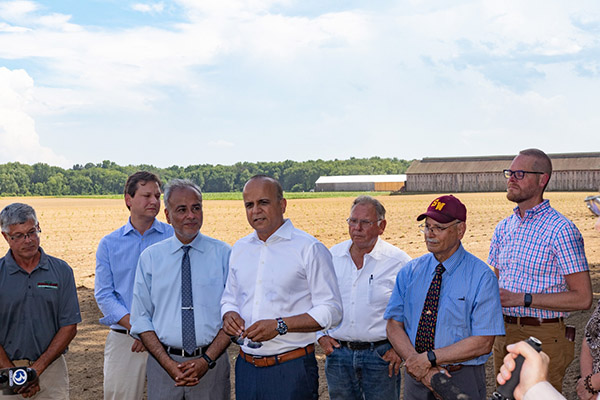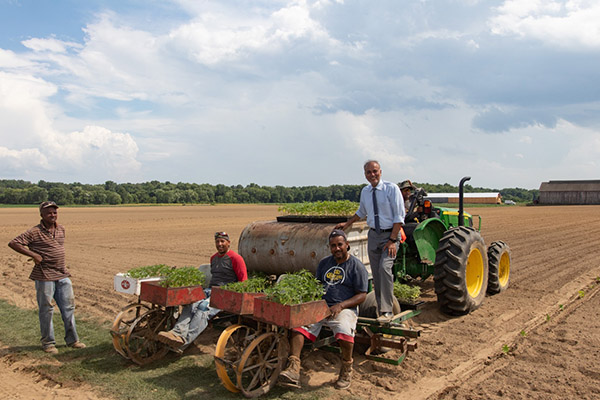Sen. Cohen Tours Local Hemp Farm in Killingworth

State Senator Christine Cohen (D-Guilford) (far left) joined Department of Agriculture Commissioner Bryan Hurlburt and Running Brook Farms Site Manager Becky Goetsch and the farm’s owner Scott Papoosha (far right) to tour the farm’s industrial hemp greenhouse and field on Friday, July 19, 2019 in Killingworth.
KILLINGWORTH, CT – Today, state Senator Christine Cohen (D-Guilford) toured one of Connecticut’s first hemp farms licensed as part of the newly legalized, industrial hemp pilot program
Sen. Cohen, the co-chair of the Environment Committee, was joined by the farm’s site manager, the first selectwoman of Killingworth, the commissioner of the state’s Department of Agriculture (DoAg), and the president of the state’s farm bureau. Throughout the 2019 legislative session, Sen. Cohen championed a bipartisan industrial hemp bill which created the brand new trade for Connecticut.
“This new industry presents a multitude of opportunities for businesses and farms across the state,” said Sen. Cohen. “It is encouraging to see farms, like Running Brook, taking advantage of this lucrative cash crop. Seeing the seedlings going into the ground for eventual sale and use generates an air of excitement and promise for these land owners and manufacturers. Ultimately, everyone in Connecticut reaps the benefits of this pro-farm, pro-business legislation.”
First Selectwoman Catherine Iino agreed and added that this new trade is great for Killingworth.
“Killingworth is committed to encouraging agriculture on its lands. Among the crops currently raised commercially in Killingworth are cranberries, lavender, mushrooms, and alpacas, and we are excited to have a hemp farm joining this array,” said Killingworth First Selectwoman Catherin Iino. “These diverse farms help to preserve the rural character that draws people to our beautiful town.”
Running Brook Farms consists of a greenhouse and full garden center. According to their website, their nursery contains the highest quality plant materials, ornamental grasses, specimen trees and shrubs. They also offer design and construction services, specializing in landscape design, utility work, masonry, tree cutting, wetlands mitigation and more. Running Brook Farms received the fourth hemp license in Connecticut and recently planted their first seeds. The farm’s site manager, Becky Goetsch, said growing hemp is an amazing opportunity.
“Having the opportunity to grow hemp is an exciting proposition on many levels,” said Goetsch. “As a business opportunity, it is phenomenal as hemp’s growing season is in total synergy with our existing nursery seasons, and will help relieve significant financial pressure due to competition from box stores. On a personal level, it is rewarding to be part of a movement that can have such an enormous impact on both health care and our environment. This also has resulted in a renewed confidence in our state, as legislators like Sen. Cohen are standing behind farmers. Getting this done this year is incredibly important as it gives us growers an entire season to work out the kinks, learn the plant, build the infrastructure for harvesting and processing, thereby positioning us for great success in the 2020 growing season.”
Public Act 19-3 requires DoAg Commissioner Bryan Hurlburt to adopt regulations for an industrial hemp pilot program in accordance with federal law. The pilot program will allow for and study the growth, cultivation and marketing of industrial hemp in Connecticut. Only sites registered with and certified by DoAg are allowed to grow hemp in the state.
“There was a lot of energy and excitement around the opportunity for hemp, which is why it was so important for the legislature to move quickly on passing the bill,” said Hurlburt. “Sen. Cohen’s leadership was instrumental in getting that done so that growers, like Running Brook, could take advantage of the program this year. The Department has worked hard to stand up the program and at this point we have approved 65 licenses for 235 acres.”
Connecticut’s legislation will jumpstart the process and positions our state to reap the benefits of industrial hemp as soon as possible, first under the 2014 farm bill and ultimately under the 2018 farm bill once federal regulations have been established. It is estimated that an acre of hemp could generate 500 to 1,500 pounds of dried flowers per acre, resulting in gross revenues of $37,500 to $150,000 per acre. The Hemp Industries Association notes that U.S. retail sales of hemp products totaled nearly $700 million in 2016.
Though a classification of cannabis, unlike marijuana, hemp has no psychotropic effects. The tetrohydrocannabinol (THC) content is less than .3 percent in hemp and the plant is used for industrial purposes. Textiles such as clothing, diapers, shoes, rope, canvas and tarps are all widely manufactured from the pulp of hemp. Paints, varnishes, fuel, insulation and solvents are also commonly made with the plants.
Additionally, a local hemp industry would fulfill a demand for locally produced CBD oil, which is currently being used in foods and personal care products, but also has medicinal uses such as alleviating some epileptic conditions. The U.S. Food and Drug Administration (FDA) recently approved a new medicine, Epidiolex, to treat seizures. It is the first FDA-approved plant-derived cannabinoid medicine.
“The passage of this year’s Hemp legislation provided many of Connecticut’s farmers the opportunity raise a new cash crop” said Connecticut Farm Bureau President Don Tuller. “I applaud the efforts of state Senator Christine Cohen and other legislators for their leadership and expedience in getting this legislation passed. This could bolster our state’s businesses, farms and much more in several ways for years to come.”
“The Connecticut Hemp Industry Association (CHIA) applauds the new industrial hemp program in Connecticut – and thanks Senators Cohen and Cathy Osten for their leadership in creating this opportunity for our farmers,” said CHIA Founder, Jeff Wentzel “Beyond farming, this new hemp program also creates opportunities for hemp processors, manufacturers, retailers and all the ancillary services involved in creating a new industry in our state. It will support business and job creation and also benefit consumers in our state, who will now have access to locally-grown quality hemp products.”
The Connecticut Hemp Association estimates more than 100 Connecticut farmers are interested in planting hemp. According to the Congressional Research Service, there are over 25,000 different uses for industrial hemp, including fibers, textiles, paper, construction and insulation materials, cosmetic products, animal feed, and food and beverages.


